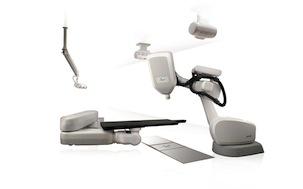
January 14, 2011 – Five-year outcomes on low-risk prostate cancer patients who were treated with a robotic radiosurgery system have been published in the January 10 issue of Radiation Oncology. The patients were treated with Accuray’s CyberKnife Robotic Radiosurgery System.
The study found that 93 percent of patients had no recurrence of their cancer at a median follow-up of five years, a rate that compares favorably to results obtained with other treatment modalities, including surgery and conventional radiation therapy.
The paper represents the longest published study to date on the use of CyberKnife radiosurgery, also referred to as stereotactic body radiotherapy (SBRT), as a treatment approach for clinically localized, low-risk prostate cancer. The study also found generally low levels of urinary and rectal toxicity following the five-day course of treatment, concluding that CyberKnife radiosurgery can achieve high rates of disease control while sparing critical structures. This thereby minimizes undesirable side effects typically associated with prostate cancer treatments and preserves patients’ quality of life.
“As a non-invasive treatment option completed in just five visits, stereotactic radiotherapy with the CyberKnife System offers patients the benefits of more rapid recovery, reduced travel costs and less time off work, allowing them to return to their normal, daily routines almost immediately as compared with the standard nine-week course of radiotherapy,” said Christopher King, M.D., an author on the study who is now an associate professor of radiation oncology and urology at the UCLA School of Medicine. “In addition, because CyberKnife radiosurgery costs less than conventional radiation and avoids the anesthesia and hospital stay associated with surgery, our national health care system benefits from reduced health care costs.”
The CyberKnife Robotic Radiosurgery System is the world’s only robotic radiosurgery system designed to treat tumors anywhere in the body non-invasively. Using continual image guidance technology and computer controlled robotic mobility, it automatically tracks, detects and corrects for tumor and patient movement in real-time throughout the treatment. This enables the system to deliver high-dose radiation with pinpoint precision, which minimizes damage to surrounding healthy tissue and eliminates the need for invasive head or body stabilization frames.
For more information: www.accuray.com


 February 04, 2026
February 04, 2026 









